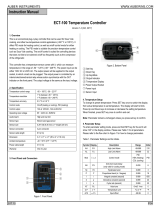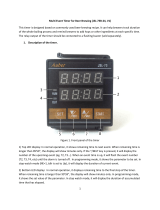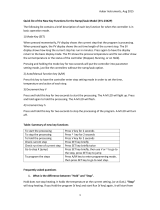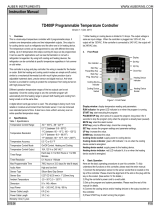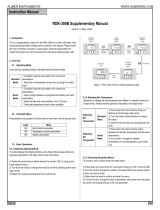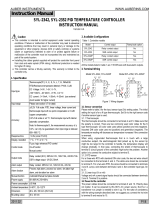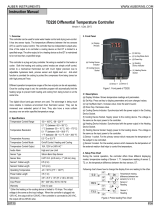Page is loading ...

AUBER INSTRUMENTS WWW.AUBERINS.COM
2017.07 P1/2
EZboil DSPR310 Quick Guide
Version 1.0 (July, 2017)
1. Quick list of key functions:
1). Key A (or Key RUN) is used to start or resume the program in step mashing mode or event timer in boiling mode. Press Key A momentarily to start the new
program/timer or resume the current held program/timer.
2). Key B (or Key HOLD/STOP) is used to hold or stop the program in step mashing mode or event timer in boiling mode. Press Key B momentarily to hold the current
program/timer. Press and hold Key B for 5 seconds to stop the current program/timer.
3). Rotary Knob. You can rotate this knob clockwise or counter-clockwise to increase/decrease the value. This knob is also needed to enter the setting menus. Push
down this knob momentarily to enter the first layer of menu, which you can reset the timer, or change between mashing and boiling modes. Push down and hold this
knob for 5s to enter second layer of menu, which you can adjust step mashing temperature & time profile, timer events in boiling mode and also other advanced alarm
& system settings. For details, please check its main manual.
2. FAQs:
1) Q: What is the difference between “HOLD” and “STOP”?
A: “HOLD” will maintain your target at previous set temperature or set percentage. For example, assuming the set temperature is 150F before “HOLD” action, after
“HOLD”, the controller will maintain at 150F as well. Or assuming the output percentage is 90% before “HOLD” action, after “HOLD”, the controller will maintain at 90%
output as well. To resume, you can press Key A momentarily.
“STOP” will stop the whole program and disable the output. There will be no output then, no matter what status it is before “STOP” action. After “STOP”, you cannot
resume the program/timer, but only restart the program/timer from the beginning. To restart, you can press Key A momentarily.
2) Q: What is the difference between “END” and “STOP”?
A: “END” is triggered by the controller. It means the whole step program or timer event is completed. After program/timer ends, the power output can be configured
either to continue heating, or shut off. It is controlled by the parameter EO in step mashing mode, or bEO in boiling mode. If you want to run another step mashing
program, you need to 1) simply reboot the controller, or 2) change “END” status to “STOP” status by the knob at first, then push Key A to restart: Push down the knob
momentarily and change “rst” to “y”, then push down the knob again to confirm.
“STOP” is triggered by key function (by holding key B), or by programmed step (you can program specific step to “STOP” in step mashing mode). When program/timer
is stopped, output will be disabled. Once “STOP”, you can only restart the program from the first step (press Key A), and you cannot go to the next step after that
“STOP” step.
3. Program Examples:
1) Step mashing program (under menu “PROG”, section 6.2 in page 5 of its main manual):
Parameter
Initial Setting
Parameter
Initial Setting
C-1
122
t-1
00:30
C-2
140
t-2
00:20
C-3
154
t-3
00:40
C-4
168
t-4
00:15
C-5
50
t-5
00:00
C-6
50
t-6
00:00
Table 1. Step mashing program example.
Each step has two parameters. C-X is the set temperature for that step, and t-X is the time duration for that step, where X is the step number. This program will control
at the temperature of 122F for 30 minutes at first. Then raise the temperature to 140F and hold there for 20 minutes. Then raise the temperature to 154F and hold there
for 40 minutes. Finally raise the temperature to 168F and hold there for 15 minutes. Then end the program (timer is set to 0 for step 5 and 6).
2) Timer event settings for boiling mode (under menu “BOIL”, section 6.3 in page 6 of manual)
nE = 3, Bot1 = 1:00, Bot2 = 00:10, Bot3 = 00:01, Bot4 ~ 9 are hidden.
This example is for: first ingredient (bot1) needs total 60 minutes of boil, the second ingredient (bot2) needs 10 minutes of boil and third ingredient (bot3) needs 1
minutes of boil. Assuming the timer will start at 0 minute (add first ingredient here). 50th minute from the beginning, controller will beep and let you add second ingredient.
59th minute from the beginning, controller will beep again to remind you it is the time to add the third ingredient.

AUBER INSTRUMENTS WWW.AUBERINS.COM
2017.07 P2/2
Figure 1. A schematic diagram of how the event timers and built-in buzzer work (nE = 3).
4. Beeping sound definition:
The pattern of the beeping sound for each condition is different. This section will help user to tell what is the beeping for:
Legend:
― 1s short beep
―― 2s long beep
――――― 5s long beep
● 1s short pause
●● 2s long pause
Step mashing mode:
1) Four 2s long beeps (―― ● ―― ●● ―― ● ――): It is separated by a 1s short pause, a 2s long pause and another 1s short pause. It indicates that current step is
finished. Starting to heat up for the next step.
2) Three 1s short beeps (― ● ― ● ―): It indicates that the current mashing step has started. The reading temperature has reached timer starting set point.
3) Eight 5s long beeps (――――― ●● ――――― ●● ――――― ●● ――――― ●● ――――― ●● ――――― ●● ――――― ●● ―――――): It indicates the
whole program has ended. Both display will flash “end”.
Boiling mode:
1) Four 2s long beeps (――●―― ●● ――●――): It is separated by a 1s short pause, a 2s long pause and another 1s short pause. It indicates that timer has
reached a timer event. It will continue this beeping pattern until the time duration programmed by parameter Ad has been reached.
2) Three 1s short beeps (―●―●―): It indicates first event timer has started. The reading temperature has reached timer starting set point, btSP.
3) Eight 5s long beeps (――――― ●●――――― ●●――――― ●● ――――― ●● ――――― ●● ――――― ●● ――――― ●● ―――――): It indicates the
whole program has ended. Both display will flash “end”.
5. Common sensor errors:
This regulator will display error message or incorrect temperature reading if your sensor is not connected, or your sensor is bad. Top display will flash “orAL” and “932”
alternately, if you set it to Fahrenheit display (C-F = ° F); or “orAL” and “500” alternately, if you set it to Celsius display (C-F = ° C).
Auber Instruments
5755 North Point Parkway, Suite 99
Alpharetta, GA 30022
www.auberins.com
Email: [email protected] Tel: 770-569-8420
Copyright 2007-2017, Auber Instruments All Rights Reserved.
No part of this manual shall be copied, reproduced, or transmitted in any way without the prior, written consent of Auber Instruments. Auber Instruments retains the
exclusive rights to all information included in this document.
/







